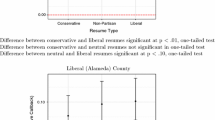Abstract
Several empirical studies have suggested that legislators engage in a surprisingly large degree of on-the-job consumption, or ideological behavior. These findings cast doubt on the hypothesis that legislators can be modelled as though they seek to maximize political support. This paper attempts to determine whether commonly used proxies for ideology in fact represent behavior to which voters are averse. The results show that legislators who engage in more of this behavior lose general-election support without generally receiving compensating increases in partyprimary support. A corollary to this result is that voters punish shirking legislators significantly.
Similar content being viewed by others
References
ACA Index, 1963–1984. Washington: Americans for Constitutional Action.
The American Jewish yearbook, 1965, 1971, 1981. Philadelphia: The Jewish Publication Society of America.
Barone, M. and Ujifusa, G. (1981, 1983, 1985).The almanac of American politics. Washington: National Journal.
Barone, M., Ujifusa, G. and Matthews, D. (1972, 1973).The almanac of American politics. Boston: Gambit.
Barone, M., Ujifusa, G. and Mathews, D. (1975, 1977, 1979).The almanac of American politics. New York: E.P. Dutton and Co.
Bender, B. (1991). The influence of ideology on congressional voting.Economic Inquiry 19: 416–28.
Bond, J. (1983). The influence of constituency diversity on electoral competition in voting for congress, 1974–1978.Legislative Studies Quarterly 8: 201–217.
Bond, J., Covington, C and Fleisher, R. (1985). Explaining challenger quality in congressional elections.Journal of Politics 47: 510–529.
Carson, R. and Oppenheimer, J. (1984). A method of estimating the personal ideology of political representatives.American Political Science Review 78: 163–178.
Congressional Quarterly almanac. (1965–1988). Washington: Congressional Quarterly.
Crain, W. M. and Goff, B. (1986). Televising legislatures: An economic analysis.Journal of Law and Economics 29: 405–421.
Dougan, W. and Munger, M. (1989). The rationality of ideology.Journal of Law and Economics 32: 119–142.
Downs, A. (1957).An economic theory of democracy. New York: Harper and Row.
Fenno, R., Jr. (1973).Congressmen in committees. Boston: Little, Brown.
Fenno, R., Jr. (1978).Home style: House members in their districts. Boston: Little, Brown.
Ferejohn, J. (1977). On the decline of competition in congressional elections.American Political Science Review 71: 166–176.
Goff, B.L. and Grier, K.B. (1993). On the (mis)measurement of legislator ideology and shirking.Public Choice 76: 5–20.
Hibbing, J. and Brandes, S. (1983). State population and the electoral success of senators.American Journal of Political Science 27: 808–819.
Jacobson, G. (1987) Running scared: Elections and congressional politics in the 1980s. In M. McCubbins and T. Sullivan (Eds.),Congress: Structure and policy 39–81. Cambridge: Cambridge University Press.
Kalt, J and Zupan, M. (1984). Capture and ideology in the economic theory of politics.American Economic Review 74: 279–300.
Kalt, J and Zupan, M. (1990). The apparent ideological behavior of legislators: Testing for principal-agent slack in political institutions.Journal of Law and Economics 33: 103–131.
Kau, J. and Rubin, P. (1979). Self-interest, ideology, and logrolling in congressional voting.Journal of Law and Economics 22: 365–384.
Lott J., Jr. (1986). Brand names and barriers to entry in political markets.Public Choice 51: 87–92.
Lott, J., Jr. (1987). Political cheating.Public Choice 52: 169–186.
Lott, J., Jr. (1990). Attendance rates, political shirking, and the effect of post-elective office employment.Economic Inquiry 18: 133–150.
Lott, J., Jr and Reed, W. R. (1989). Shirking and sorting in a political market with finite-lived politicians.Public Choice 54: 75–96.
Murphy, K. and Topel, R. (1985) Estimation and inference in two-step econometric models.Journal of Business and Economic Statistics 3: 370–379.
The official Catholic directory (1960, 1970, 1980). New York: P.J. Kennedy and Sons.
Pagan, A. (1984). Econometric issues in the analysis of regressions with generated regressors.International Economic Review 25: 221–247.
Peltzman, S. (1976). Toward a more general theory of regulation.Journal of Law and Economics 19: 211–240.
Peltzman, S. (1984). Constituent interest and congressional voting.Journal of Law and Economics 27: 181–210.
Poole, K. and Rosenthal, H. (1989). Patterns of congressional voting. Unpublished manuscript.
Scammon, R. (Ed.),America votes. (1959, 1962, 1964). Pittsburgh: University of Pittsburgh Press.
Scammon, R. (Ed.),American votes. (1966, 1968, 1970, 1972, 1973, 1975). Washington: Congressional Quarterly.
Scammon, R. and McGillivray, A. (Eds.)America votes. (1977, 1979, 1981, 1983, 1985, 1987). Washington: Congressional Quarterly.
Schantz, H. (1980). Contested and uncontested primaries for the U.S. House.Legislative Studies Quarterly 5: 545–562.
Stigler, G. (1971). The theory of economic regulation.Bell Journal of Economics 2: 3–21.
Stigler, G. (1972). Economic competition and political competition.Public Choice 37: 91–106.
U.S. Bureau of the Census. (1980, 1982, 1986).State and metropolitan area data book. Washington: U.S. Government Printing Office.
U.S. Bureau of the Census. (1964–1987).Statistical abstract of the United States. Washington: U.S. Government Printing Office.
Wright, M. (1989). Shirking, political support, and agency costs in political markets. Unpublished Ph.D. dissertation. University of California, Los Angeles.
Author information
Authors and Affiliations
Additional information
I am indebted to the members of my dissertation committee — Harold Demsetz (Chair), Jeffry Frieden, Benjamin Klein, Thomas Schwartz, Carol Simon, and Michael Waldman — for their invaluable assistance. I also acknowledge the helpful comments of Trudy Cameron, Paul Clyde, Kevin Grier, John Lott, Russell Roberts, and seminar participants at UCLA and the University of Chicago. The Bradley Foundation and the Foundation for Research in Economics and Education provided financial support. The views expressed in this paper do not necessarily reflect those of the U.S. Department of Justice. Any errors are my own.
Rights and permissions
About this article
Cite this article
Wright, M.B. Shirking and political support in the U.S. Senate, 1964–1984. Public Choice 76, 103–123 (1993). https://doi.org/10.1007/BF01049345
Accepted:
Issue Date:
DOI: https://doi.org/10.1007/BF01049345




